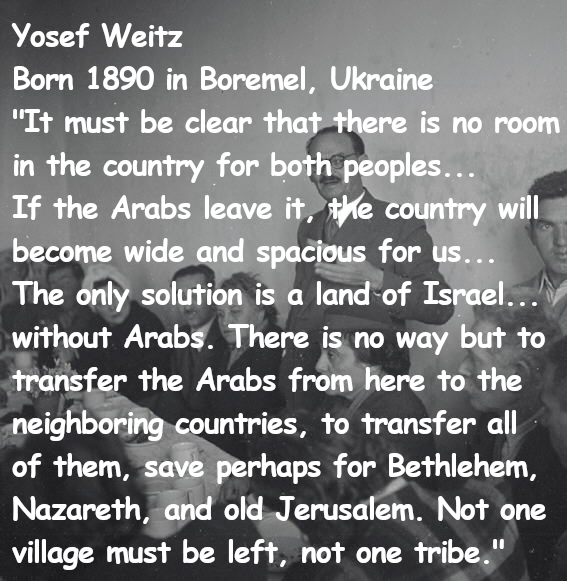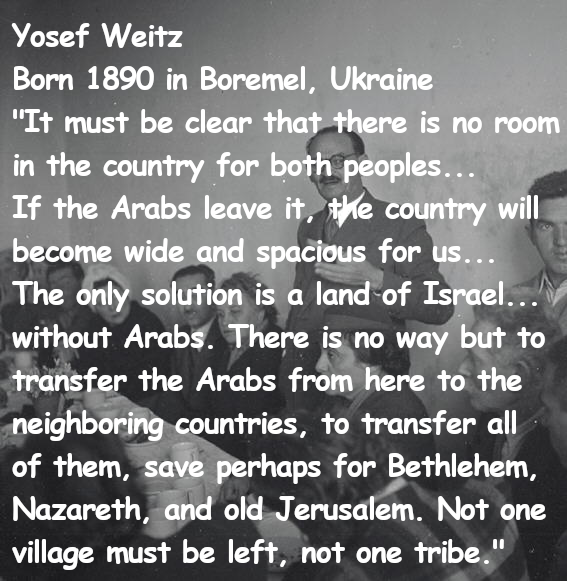"It must be clear that there is no room in the country for both peoples... If the Arabs leave it, the country will become wide and spacious for us... The only solution is a land of Israel... without Arabs. There is no way but to transfer the Arabs from here to the neighboring countries, to transfer all of them, save perhaps for Bethlehem, Nazareth, and old Jerusalem. Not one village must be left, not one tribe."
-- Yosef Weitz
Analyzing Yosef Weitz's statement under contemporary international law, particularly through the lenses of the Geneva Conventions and the Rome Statute, involves looking at several key legal principles:
### **Geneva Conventions:**
1. **Article 49 of the Fourth Geneva Convention**: This article specifically prohibits "individual or mass forcible transfers, as well as deportations of protected persons from occupied territory." Weitz's advocacy for the transfer of the Arab population would clearly contravene this principle if interpreted as forced or coerced transfer during a period where such actions would classify under occupation or conflict.
2. **Protection of Civilian Population**: The Geneva Conventions emphasize the protection of civilians, especially in occupied territories. Any forced transfer or eviction without due legal process and humanitarian considerations would be in violation of these protections.
### **Rome Statute of the International Criminal Court:**
1. **War Crimes**:
- **Article 8(2)(b)(viii)**: This article defines as a war crime the "transfer, directly or indirectly, by the Occupying Power of parts of its own civilian population into the territory it occupies, or the deportation or transfer of all or parts of the population of the occupied territory within or outside this territory." Weitz's statements could be seen as promoting an act that falls under this definition if implemented in a context of occupation.
- **Ethnic Cleansing**: While not explicitly mentioned in the Rome Statute, the context of Weitz's statement can be analyzed through the lens of ethnic cleansing, which involves the deliberate and systematic attempt to remove an ethnic or religious group from a given territory. Such actions might be prosecuted as crimes against humanity under various articles if they involve forcible transfer or deportation.
2. **Crimes Against Humanity**:
- **Article 7(1)(d)**: Deportation or forcible transfer of population could constitute a crime against humanity if done as part of a widespread or systematic attack directed against any civilian population, with knowledge of the attack.
### **Contemporary Legal Implications:**
- **Self-Determination**: Under international law, peoples have the right to self-determination, which includes the right to freely determine their political status and to pursue their economic, social, and cultural development. Weitz's statement suggesting the removal of one population to favor another directly opposes this principle.
- **Proportionality and Necessity**: International humanitarian law requires that actions taken must be necessary and proportional to the military advantage sought. Advocating for the transfer of an entire population group for the purpose of demographic change does not meet these criteria under contemporary legal standards.
- **Human Rights**: The Universal Declaration of Human Rights and subsequent human rights treaties emphasize rights like freedom of movement, domicile, and protection against arbitrary expulsion, which would be violated by forced population transfers.
Analyzing Weitz's statement today, it would be seen as advocating for policies that contravene fundamental principles of international humanitarian law and human rights law. The legal framework has evolved to explicitly prohibit such actions, aiming to prevent exactly the kind of ethnic cleansing and population manipulation that was contemplated in his writings. However, it's important to contextualize historical statements within their time while acknowledging that the legal standards of today would view these actions as violations of international law.

